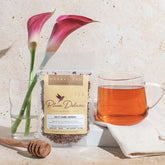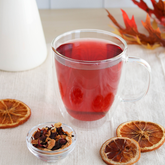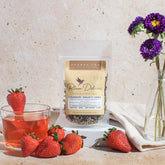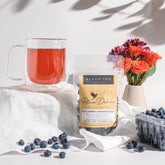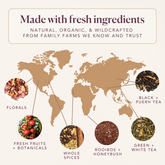My first answer to the question of where to buy elderberry tea is from a reputable seller because some elderberry species are poisonous! In fact, even the two species with edible berries contain toxic substances.
Worse still, those edible berries themselves can cause nausea, vomiting, and diarrhea if they are not yet ripe. Sheesh!
DIYers, know thy Sambucus!
On the other hand, elderberry tea from a trustworthy source is a soothing, healthful comfort like warm, woolen socks in winter.

What’s the Deal with Elderberry?
Do I sound hot and cold about elderberry tea? How appropriate: elderberry tea is excellent hot and cold! Let’s get ourselves sorted about this yummy bevvy, okay?
Elderberries are flowering plants in the Sambucus genus. Different species have berries that range from black to blue, to red, and species matters!
Here in Alaska, our red-berried elder, Sambucus racemose, has elegant clusters of white flowers in spring and brilliant red berries in autumn that stay on the plants into winter because even the birds don’t eat them. I love wild harvesting various petals, leaves, and fruits, but my freezers and shelves are bare of elderberries. All parts of our red-berried elder are poisonous.
However, two species of elderberries have edible parts: the European or Black elderberry, Sambucus nigra, and the American or Common Elderberry, Sambucus Canadensis.
Note that I said edible parts. We’re talking flowers and berries. Leave those leaves, stems, and roots alone, okay? These, along with raw, unripe berries contain toxins (sambunigrin, for example) that can make us sick, causing nausea, vomiting, and diarrhea.
But who wants unripe berries, anyway? If you need an additional layer of certainty, know that heat from cooking eliminates the toxin.
I’m all for DIYing, but if you’re not sure about elderberries, get help from a knowledgeable person or leave elderberry tea prep to the pros. It’s worth doing because properly prepared elderberry tea is delicious and even healthful.

Elderberry Tea Health Benefits: Immunity Support
Historically, elderberry has been used in folk medicine to treat symptoms of colds and flu. We’re talking from waaaay back, too: Hippocrates mentions elderberry as a “medicine chest.” If you’re not keen to take health advice from Hippocrates, well, I’m right there with you.
According to the US Department of Agriculture, whole elderberries contain calcium, iron, magnesium, vitamin C, Potassium, and vitamin A. They have a high concentration of anthocyanin, a polyphenol that acts as an antioxidant and gives the berries their deep purple-blue color. Some of those nutrients are retained in brewed teas.
In addition, studies have been and continue to be done with elderberries, and the National Institute of Health reports that “Some preliminary research suggests that elderberry may relieve symptoms of flu or other upper respiratory infections.”
Naturopathic doctors recommend elderberry teas, syrups, and extracts to boost and support the body’s immune system.

What Does Elderberry Tea Taste Like?
A strong brew of Just Elderberries tastes like burnt sugar with a lingering edge of berry to me. (I do not mean burned sugar, as in ruined. I’m talking about delicious, intentionally-burnt sugar.) It’s a deep, warm flavor. Molasses-y.
Elderberry tea has a reputation of being tart, and there’s an early hint of tartness in my strong brew. I think the tartness is the first thing that steeps out of elderberries because that edge seems stronger when the brew is weaker. Go figure. A long, strong brew brings out a deeper, more complex flavor.
Whether aiming to extract the tartness or the earthy warmth, elderberry blends well. Plum Deluxe, as we’ve come to expect, nails this. Prior to this assignment, I enjoyed Strawberry Immunity herbal tea solely for its best-of-the-season summer-strawberry flavor. It’s fabulous both hot and iced, and unlike many summer-berry flavors, I sip this one year-round. Huh. Must try this one with almond milk.
The Self Care Blend of elderberry and apricot is a light, smooth blend that demonstrates how elderberry plays nicely with other flavors: although elderberry is listed before apricot, which means there is more elderberry than apricot in the blend, it’s the apricot flavor that dominates. Maybe elderberry supports other flavors the way it supports immune systems.
I’m taking this as a clue about where to add Just Elderberries for my own blends: tart elderberry works well with sweet flavors. By the way, I loved it with a splash of lemon juice, too.

Where to Buy Elderberry Tea
Circling back to the question of where to buy elderberry tea, I propose you start right here. As always, Plum Deluxe uses choice ingredients. In this case, we have teas with wild-crafted elderberries, which means unmodified berries, harvested in their natural, uncultivated environment in a sustainable manner. That speaks directly to this wild harvester’s heart.
Best of all, you can find an Elderberry Immunity Kit with five elderberry teas plus elderberry honey drops for 15% off! That means one of those five teas is free.
Elderberry Fun Fact (and another reason to embrace elderberry everything)
Elderberry juice is used as a colorant in various products, including foods. The US Food and Drug Administration allows “elderberry juice color” to be used in certified organic foods. Hmmm. Shall we try dyeing some sock wool in elderberry tea for flu-fighting woolly winter warmth?

![Holiday Tea Variety Pack [6-Pack Variety of Flavors]](http://www.plumdeluxe.com/cdn/shop/files/holidayTeaVarietyPack.png?v=1759777907&width=165)


